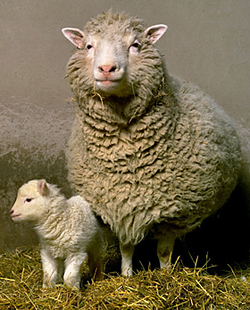Cloning – the science fact behind the science fiction
Mon, 27 Jan 2014 11:14:00 GMT
Hudds scientist explains the positives of cloning
 IT was 18 years ago that Dolly the sheep was born (pictured with her lamb), but in the minds of many people, cloning remains within the realm of science fiction and has a sinister image. Now, a University of Huddersfield scientist, who has carried out research into many aspects of cloning, aims to set the record straight.
IT was 18 years ago that Dolly the sheep was born (pictured with her lamb), but in the minds of many people, cloning remains within the realm of science fiction and has a sinister image. Now, a University of Huddersfield scientist, who has carried out research into many aspects of cloning, aims to set the record straight.
Dr Dougie Clarke (pictured below) will give a free public lecture on the massive advances that have been made in cloning animals, cells and DNA and how it is leading to major medical breakthroughs.
For example, cells from a patient’s own skin can be used to create cells which could help repair damage to the spine, heart or brain or eyes. Personalised drug therapies plus the long-term prediction of serious illness are also becoming a reality, with massive health benefits and the potential for huge cost savings thanks to advances in DNA cloning.
Dr Clarke, a molecular biologist who came to the University of Huddersfield in 1998, is Head of Biological Sciences and Nutrition.
 His lecture – Cloning and You – takes place on Wednesday 12 February (6.30pm) at the University’s Canalside West Lecture Theatre. It is free and open to all, and part of a series of lectures organised by the University of Huddersfield’s School of Applied Sciences. For further information, telephone 01484 473138 or email Janet Goodridge on j.e.goodridge@hud.ac.uk.
His lecture – Cloning and You – takes place on Wednesday 12 February (6.30pm) at the University’s Canalside West Lecture Theatre. It is free and open to all, and part of a series of lectures organised by the University of Huddersfield’s School of Applied Sciences. For further information, telephone 01484 473138 or email Janet Goodridge on j.e.goodridge@hud.ac.uk.
Jurassic Park and the cloning of extinct animals
Reproductive cloning is the high profile, often ethically troubling dimension of this branch of science. In the USA, it is already possible – for thousands of dollars – to have a pet cat or dog cloned. The film Jurassic Park is still a fantasy, but the cloning of extinct animals from DNA is not an insurmountable problem, says Dr Clarke.
Animal species on the verge of extinction could be rescued by the creation of clones from specially-preserved tissue samples. China has a new pig cloning facility that can produce hundreds of animals for food and for medical research.
However, human cloning is “ethically, a big, big problem” says Dr Clarke.
“No doubt there will be someone in the future who is mad enough to try it, but it is governed by very strict regulations.”
The prospect of creating a cloned embryo and growing it so that organs could be obtained for transplantation would be “totally unethical for me and most sane people”, adds Dr Clarke.
But his lecture will describe a wide range of the ethically acceptable and beneficial results from research into cloning and DNA. Dr Clarke – who has earned his highest media profile for a nationwide investigation into rats whose genes mutate so that they become immune to rodenticides – has taken part in a wide range of research projects that involve the cloning of genes from different organisms and has been involved in characterising human cells that could be used to repair damaged tissue in arthritic conditions.
“People certainly shouldn’t be afraid of cloning. It has enabled us to understand the genetic blueprint of life and is now leading to major medical breakthroughs for disease diagnosis and treatment,” says Dr Clarke.







